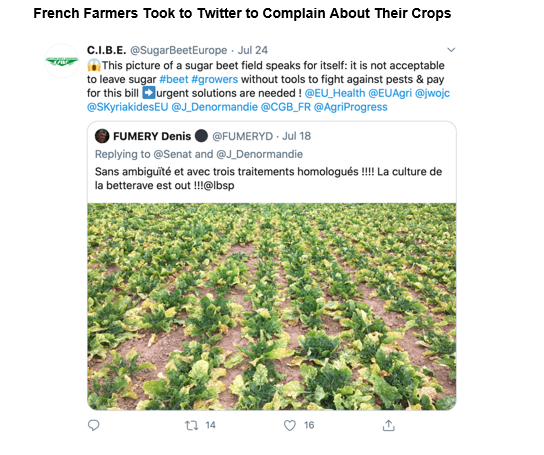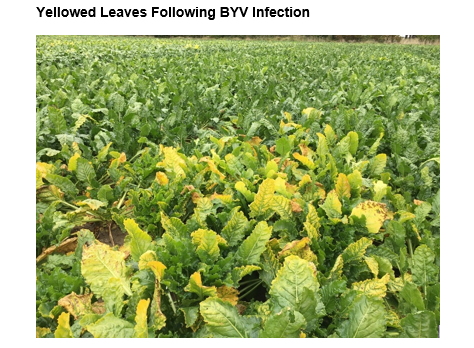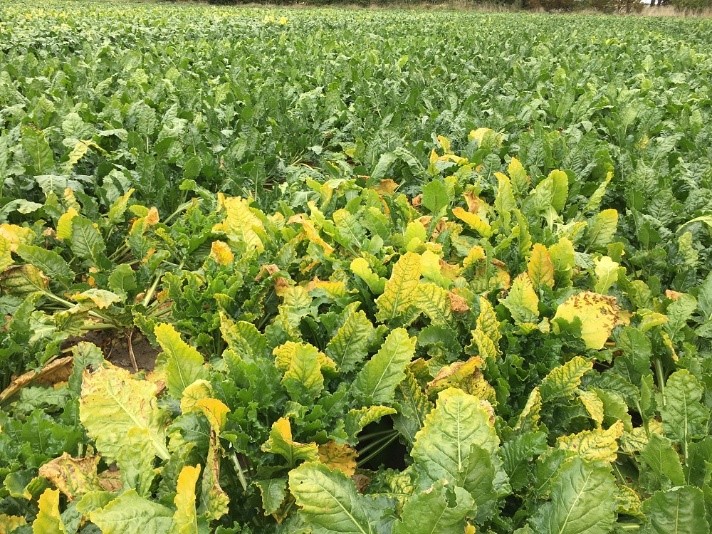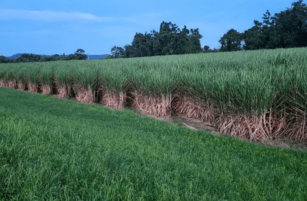- France might remove the ban on neonicotinoid beet seed treatments that protect against beet yellow virus.
- As it’s a seed treatment, it won’t help this year’s crop, but will offer excellent protection in seasons to come.
- Will other European countries follow?
Beet Yellows Virus Continues to Cause Problems
- This season’s French sugar beet crop has been hit by beet yellows virus (BYV).
- However, it is very difficult to see how widespread the issue is.
- We think France will produce 4.4m tonnes of sugar this season (25% of EU production); their poorest production for five years.
- If average yields decrease by a further 10%, another 440k tonnes of sugar production would be lost.

- At this stage, we think the rest of the EU’s sugar producers are largely unaffected by the BYV.
The Proposal: A Three-Year Removal ofthe EU Neonics Ban
- The French government will support an amendment in parliament that exempts beet growers for up to three years from the general EU ban on the use of neonicotinoids, an insecticide that protects crops against beet yellow virus (BYV).
- This comes after pressure from farmers concerned that this year’s beet crop will be significantly impacted.

- The Government will also offer 5 million euros to help researchers find alternatives for neonicotinoids.
- Whilst this sum may seem large, it will not go very far; this sort of research is extremely costly.
- The Government will also offer compensation to growers who are most affected this year.
What is Neonicotinoid Treatment and Why is it Important?
- Plants infected by the virus can lose up to 50% of their yield.
- Virus outbreaks in the early 1970s caused severe yield losses and forced many growers to stop growing beet.
- A milder version of the virus (Beet Mild Yellowing Virus) will lead to 22% yield loss. The leaves of the plant turn yellow and this severely impacts the photosynthetic leaf area, reducing both yields and sugar

- Neonicotinoids are active substances used in plant protection products to control harmful insects.
- They are insecticides; their name literally means “new nicotine-like insecticides” – they are chemically similar to nicotine.
- They are currently the only known insecticide that can protect against BYV; aphids, that spread BYV, are resistant to all other insecticides.
- This makes them highly important for protecting sugar beets.
- Before the ban, neonicotinoids were used to treat 97% of beet seeds in France.
- During this period, BYV all but disappeared from the country, highlighting the effectiveness of theinsecticides.
Why Were Neonics Banned?
- In 2018, before the start of the 2018/19 season, the EU extended their ban on the use of neonicotinoids to sugar beet due to concerns that they were harmful to bees and other pollinators.
- The neonicotinoid is absorbed by the plant and ultimately reaches the pollen.
- In laboratory conditions, this was shown to cause harm to pollinators, such as bees.
- However, for sugar beet this argument is nonsensical as beet doesn’t flower in its first year of growth and is harvested before it reaches its second year!
Are the Rest of the EU Allowed to Use Neonics?
- After the initial ban by the EU, many of the smaller and less efficient producers within the EU were given exemptions to the ban.
- Their sugar beet area was not deemed large enough to pose a serious threat to bees.
- The ban remained in place across the North-West Beet Belt (UK, France, Germany, Netherlands).
- For now, we think it’s unlikely that other countries will follow suit, as BYV outside of France has been very limited.
- Earlier in 2020, the National Farmers Union (UK) was working closely with lawyers to overturn the ban, but there has been no change in stance so far.
Other Opinions You May Be Interested In…
Worst Russian Sugar Production in Five Years
EU: Sugar Imports Fall As Coronavirus Hits Consumption















